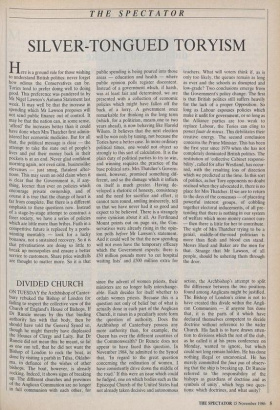DIVIDED CHURCH
ON TUESDAY the Archbishop of Canter- bury rebuked the Bishop of London for failing to respect the collective view of the Church of England's House of Bishops. If Dr Runcie means by this that binding authority lies with that body, then he should have told the General Synod so, though he might thereby have displeased the Houses of Clergy and Laity. But Dr Runcie did not mean this: he meant, so far as one can tell, that he did not want the Bishop of London to rock the boat, as done by visiting a parish in Tiilsa, Oklaho- ma, in defiance of the wishes of other bishops. The boat, however, is already rocking. Indeed, it shows signs of breaking up. The different churches and provinces of the Anglican Communion are no longer in full communion with each other, for since the advent of women priests, their ministers are no longer fully interchange- able. Each decides for itself whether to ordain women priests. Because this is a question not only of belief but of what is actually done in each part of the Anglican Church, it raises in a peculiarly acute form the question of authority. Does the Archbishop of Canterbury possess any more authority than, for example, the Queen has over the different countries of the Commonwealth? Dr Runde does not appear to have faced this question. In November 1984, he admitted to the Synod that, 'In regard to the great question concerning the ordination of women, I have consistently drive down the middle of the road.' If this were an issue which could be fudged, one on which bodies such as the Episcopal Church of the United States had not already taken decisive and autonomous
action, the Archbishop's attempt to split the difference between the two positions found among Anglicans might be justified. The Bishop of London's crime is not to have created this divide within the Angli- can Communion — if anyone has done that, it is the parts of it which have declared themselves competent to decide doctrine without reference to the wider Church. His fault is to have drawn atten- tion to divisions which the rest of the club, as he called it at his press conference on Monday, wanted to ignore, but which could not long remain hidden. He has done nothing illegal or uncanonical. He has merely committed the faux pas of observ- ing that the ship is breaking up. Dr Runcie referred to 'the responsibility of the bishops as guardians of doctrine and as symbols of unity', which begs two ques- tions: which doctrines, and what unity?


































































 Previous page
Previous page